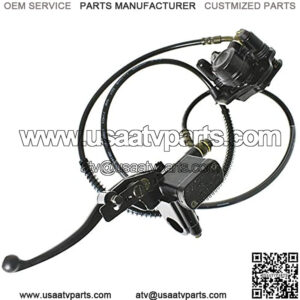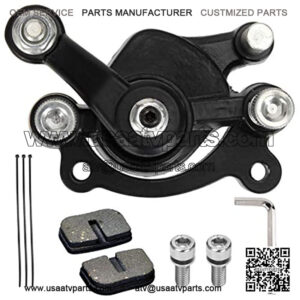Although both the drum and disc braking systems slow down your moving vehicle by generating friction, there are some key differences between the two, like their:
A. Method Of Braking
Both drum brakes and disc brakes use hydraulic mechanisms to generate braking force.
Essentially, when you push down on your vehicle’s brake pedal, a piston inside the master cylinder compresses brake fluid and transmits it to points near your wheels via brake lines.
In a drum braking system, this pressurized brake fluid forces the pistons inside the wheel cylinder outwards. These pistons, in turn, push a set of drum brake shoes against the brake drum to generate friction, slowing down your vehicle.
On the flip side, in a disc braking system, the pressurized brake fluid is delivered to a brake caliper. This brake caliper then squeezes a set of disc brake pads (a.k.a. friction pads) against the brake rotor (a.k.a. wheel rotor or brake disc), generating stopping friction.
B. Braking Power
Your rotating disc brakes are constantly exposed to the atmosphere, so they can dissipate the heat generated during braking quickly.
But since drum brakes are closed (not exposed to air), heat dissipation would be much slower. This can cause brake fade, which is a loss in braking power due to overheating due to inefficient heat dissipation.
The disc brakes’ exposure to the air outside also means that it’ll work better in wet conditions.
How?
Since a disc brake is open to the atmosphere, it can sling off any moisture accumulated while driving quickly. Moreover, the brake or friction pads rubbing against the wheels can also wipe away any water, just like how your wiper blade wipes the water off your windshield.
In drum brakes, however, moisture might get trapped inside the drum and take more time to dry. This can affect the frictional force your brake shoe and brake drum pair can generate, compromising braking power.
C. Brake Maintenance Needs
Disc brakes are self-cleaning.
Remember, your brake pad wipes the rotor when engaged. This usually removes any debris that may be clinging to the wheel or brake rotor.
On the other hand, since drum brakes are generally closed, they’re prone to accumulating the brake dust generated by the drum brake shoes. If the dust accumulated becomes excessive, your brake performance may decline.
As a result, your drum brakes will need to be cleaned and serviced more often than disc brakes to ensure optimum brake performance. Additionally, since your drum brakes include more components, they’re usually more difficult to service.
Now that you know the critical differences between drum brakes and disc brakes let’s move on to the pros and cons of each of these brakes.
What Are The Pros And Cons Of Using The Drum Brake System?
Let’s first check out the advantages of using drum brakes for your vehicle.
Usually, drum brakes:
- Require less hydraulic pressure due to a built-in self-energizing effect
- Are somewhat easy to recondition
- Are affordable to manufacture and install
Unfortunately, drum brakes have a few significant disadvantages as well.
They:
- Can overheat easily and cause drum distortion, which in turn leads to vibrations while braking
- Involve several parts, which leads to more chances of failure
- Take more time to service due to their complexity
Next, let’s take a glimpse at the upsides and downsides of using disc brakes in your vehicle.
What Are The Pros And Cons Of Using The Disc Brake System?
Disc brakes are a fantastic addition to your car because they:
- Offer excellent stopping power
- Are less susceptible to rusting and degradation
- Experience less brake fade, leading to more consistent disc braking force
However, these brakes have their own set of limitations.
Disc brakes:
- Are costlier to manufacture and install
- Are difficult to recondition
- Require a separate parking brake (a.k.a. handbrake or emergency brake) mechanism
About brake
“atv brake pads”
“atv brake lines”
“best atv brake pads for mud”
“atv brakes”



